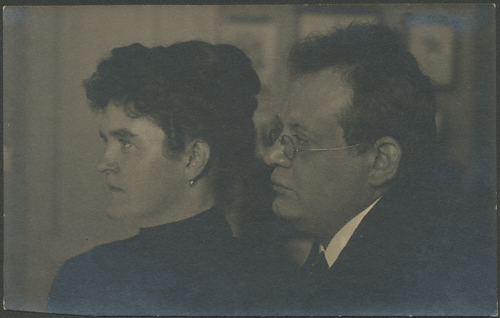1. Leipzig
In February, Reger receives the appointment as Court kapellmeister of Duke Georg II of Saxe-Meiningen, which he gladly accepts in deepest dissatisfaction with the Leipzig reception of his works, however, under the condition to be able to keep the position at the conservatoire. After signing the contract on 1 December, he immediately plunges into the wildest concert planning for the coming season, in which he wants to revive the travelling style à la Hans von Bülow and Fritz Steinbach and lead the Meiningen orchestra to former greatness.
His last months in Leipzig continue to be marked by failures at home (among others at the premiere of the String Sextet in F major, Op. 118) and successes on his travels. In March, Reger is appointed court councillor by Duke Carl Eduard of Saxe-Coburg-Gotha and dedicates the third volume of his piano pieces Aus meinem Tagebuche, Op. 82, to him in gratitude. At the Darmstadt Music Festival in May, the 100th Psalm, Op. 106, is performed twice in succession at the request of the Hessian Grand Duke Ernst Ludwig, and a first BachReger Festival takes place in Bad Pyrmont under Fritz Busch.
In June, not only Elsa Reger’s father Ernst von Bagenski dies, but also Max Reger’s mother, who had spent the last year of her life in a mental home and for whom death “only meant redemption”1. In autumn, Reger goes on a highly successful, week-long tour with Philipp Wolfrum, performing works by Johann Sebastian Bach in idiosyncratic but convincing interpretations, while his wife organises the family’s move to Meiningen.

At the Berlin premiere of the Weihe der Nacht, Op. 119, in October by the dedicatee Gertrud Fischer-Maretzki, Reger promises to become a teetotaller,2Meiningen as well.
2. Meiningen
After taking up his post in Meiningen on 1 December, Reger’s daily dealings with the tradition-steeped Hofkapelle lead him to create orchestral works of the most varied styles, as if he were varying the alternatives to the symphony and sounding out the tonal possibilities of the instrumental body. The bulky-massive instrumentation of earlier works is thinned out, he creates scores in which “every little note is precisely “calculated sound-wise”” (letter of 3 October 1914 to the publisher N. Simrock). He pays homage to his new employer, Duke George II, with the Concerto in the Old Style, Op. 123, with the express intention of reviving the courtly old form of the Baroque concerto.
Postal items from this year whose sender or addressee is Max Reger.
Images from the Max Reger Foto Gallery that originate from this year and have a direct reference to Max Reger.
Object reference
Max Reger Biography – 1911, in: Reger-Werkausgabe, www.reger-werkausgabe.de/bio_1911.html, version 3.1.0, 23rd December 2024.
Information
This is an object entry from the RWA encyclopaedia. Links and references to other objects within the encyclopaedia are currently not all active. These will be successively activated.